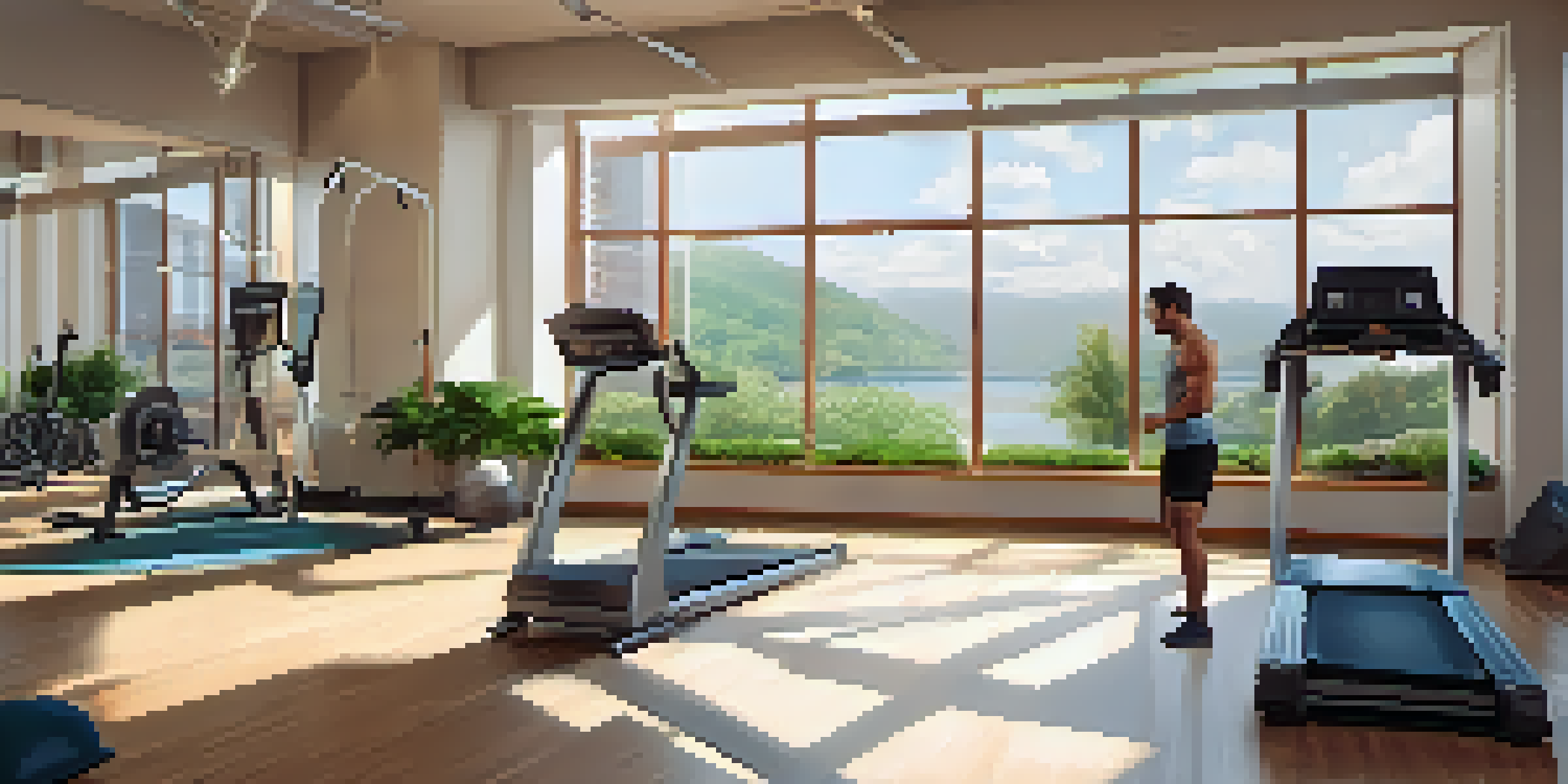Joint Care in Bodybuilding: Strategies for Longevity

Understanding Joint Stress in Bodybuilding
Bodybuilding involves repetitive motions that can put significant stress on your joints. Over time, this stress can lead to wear and tear, especially in high-impact exercises like squats and deadlifts. Understanding how your body mechanics play a role in joint health is crucial to prevent injuries.
The human body is the best picture of the human soul.
For instance, improper form during lifts can exacerbate joint strain, leading to discomfort or chronic issues. It’s important to listen to your body; if a particular movement feels off, it might be time to reassess your technique. Emphasizing proper alignment not only boosts performance but also protects your joints.
Related Resource
Incorporating mobility exercises can help mitigate the stress on your joints. These gentle movements maintain flexibility and strength in the surrounding muscles, providing additional support to the joints. A mindful approach to your workouts can make a world of difference in your joint longevity.
The Role of Nutrition in Joint Health
Nutrition plays a pivotal role in maintaining joint health, especially for bodybuilders. A diet rich in anti-inflammatory foods can help reduce joint pain and improve recovery times. Think of incorporating foods like fatty fish, nuts, and leafy greens, which provide essential nutrients that support joint function.

Moreover, staying hydrated is often overlooked but is crucial for joint lubrication. Water helps maintain the synovial fluid that cushions your joints during workouts. As a bodybuilder, you’re likely sweating a lot, so make sure you replenish fluids consistently throughout the day.
Joint Health Requires Proper Care
Understanding joint stress and using proper technique during lifts is crucial for preventing injuries in bodybuilding.
Supplements can also be beneficial for joint health. Ingredients like glucosamine and chondroitin are often recommended to support cartilage health. Before adding any new supplements, however, it’s wise to consult with a healthcare professional to ensure they align with your individual needs.
Incorporating Recovery Strategies
Recovery is a critical component of joint care in bodybuilding. After intense workouts, your muscles and joints need time to heal, and this is where effective recovery strategies come into play. Techniques like foam rolling and gentle stretching can help alleviate muscle tightness and improve blood flow to the joints.
Take care of your body. It's the only place you have to live.
Consider incorporating rest days into your routine. Rest allows your body to repair itself and reduces the risk of overuse injuries that can affect your joints. It’s important to listen to your body; sometimes, a day off can be more beneficial than pushing through the pain.
Related Resource
Additionally, practices such as yoga or Pilates can enhance flexibility and strength in a low-impact manner. These activities not only promote recovery but also improve your overall body awareness, making you less prone to injuries in the long run.
Proper Warm-Up and Cool-Down Techniques
Warming up properly is essential to prepare your joints for the physical demands of bodybuilding. A good warm-up increases blood flow to the muscles and lubricates the joints, reducing the risk of injury. Dynamic stretches and light cardio can effectively prime your body for the workout ahead.
On the flip side, cooling down post-workout is equally important. Gradually lowering your heart rate and incorporating static stretches can help prevent stiffness and promote flexibility. This practice allows your joints to recover more effectively from the stress they endured during your workout.
Nutrition Aids Joint Recovery
Incorporating anti-inflammatory foods and staying hydrated can significantly support joint health and recovery.
Developing a consistent warm-up and cool-down routine will not only enhance your performance but also protect your joints in the long run. Think of it as your body’s way of easing in and out of exercise, creating a smoother transition that benefits your overall joint health.
Listening to Your Body: Signs of Joint Issues
One of the most important skills a bodybuilder can develop is the ability to listen to their body. Pain or discomfort in the joints is often a sign that something isn’t right. Ignoring these signals can lead to more serious injuries down the line, so it’s essential to address any issues promptly.
Common signs of joint problems include persistent pain, swelling, or decreased range of motion. If you experience any of these symptoms, it may be wise to modify your workout routine or seek professional advice. Being proactive about joint health can save you from long-term setbacks.
Related Resource
Remember, taking a step back doesn’t mean you’re not dedicated; it means you’re prioritizing your health. Adjusting your training regimen to accommodate your body’s signals is a sign of maturity in your bodybuilding journey.
Strengthening Supporting Muscles
Building strength in the muscles surrounding your joints can significantly enhance joint stability. Strong muscles provide support, reducing the strain placed on the joints during heavy lifting. Incorporating exercises that target these supporting muscles is a vital strategy for joint care.
For example, strengthening your core can improve your overall stability, making it easier to maintain proper form during lifts. Similarly, working on the muscles in your hips and shoulders can ensure that your joints remain properly aligned and supported during workouts.
Listen to Your Body's Signals
Being attentive to signs of joint discomfort allows bodybuilders to adjust their routines and prevent serious injuries.
Incorporating resistance training that focuses on these areas not only boosts your performance but also extends the longevity of your joints. Think of it as building a strong foundation for a house; without it, everything else is at risk.
Consulting Professionals for Joint Care
When it comes to joint care, seeking professional guidance can be invaluable. Physical therapists, trainers, and sports medicine specialists can provide personalized advice tailored to your specific needs. They can help identify any weaknesses or imbalances that may be affecting your joints.
Regular check-ins with professionals can keep you on the right track, especially as you progress in your bodybuilding journey. They can recommend exercises or modifications that align with your goals while prioritizing joint health.

Furthermore, if you’re experiencing ongoing pain or discomfort, a professional can help diagnose potential issues before they escalate. Investing in your joint health is a crucial part of ensuring longevity in bodybuilding.